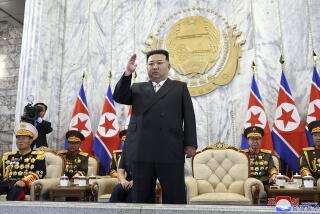Military Parade Marks Soviet Revolution : But Gorbachev’s Speech Is Less Warlike Than Propaganda of Past
- Share via
MOSCOW — The Soviet Union celebrated the Bolshevik Revolution’s 68th anniversary today with the customary parade of military might through Red Square, but with much less anti-Western propaganda than usual.
Soviet leader Mikhail S. Gorbachev struck a conciliatory tone, telling a reception after the traditional military show of strength that he hoped the Geneva summit will help remove “distrust, hatred and suspicion.”
Gorbachev said he sought “a constructive dialogue and a search for mutually beneficial agreements” with the United States.
His speech inside the Kremlin came only 12 days before President Reagan and Gorbachev meet in Geneva for the first superpower summit in six years.
Defense Minister Sergei Sokolov vowed in his address to massed soldiers in dress uniforms that “a crushing rebuff” would be dealt any aggressor. He accused U.S. of imperialism in threatening war, but such statements by the defense minister are part of the ritual.
A milder tone was evident in the slogans on posters and banners carried by the thousands of people who flooded the huge cobblestoned square after the parade, as they do each year. The messages were less fiercely militaristic than in the past, reflecting the calls of Gorbachev for better economic performance and advancement in technology.
Symbols of the leader’s effort to modernize industry included an outsized model of an electronic calculator with a slogan proclaiming that Moscow schoolchildren are being taught computer technology.
A long column of tanks, armored personnel carriers and missiles rumbled across the square in precise formation to commemorate the revolution, which occurred on Oct. 24, 1917, by the Julian calender but which is observed on Nov. 7 by the Gregorian calendar.
Gorbachev and the nine other Politburo members based in Moscow watched the two-hour parade from atop the Lenin mausoleum, waving occasionally to the passing masses.
Among those missing from the stands reserved for foreign correspondents and diplomats was U.S. Ambassador Arthur A. Hartman, who continued the parade boycott begun by ambassadors of NATO countries in 1980 to protest the Soviet intervention in Afghanistan.
More to Read
Sign up for Essential California
The most important California stories and recommendations in your inbox every morning.
You may occasionally receive promotional content from the Los Angeles Times.













